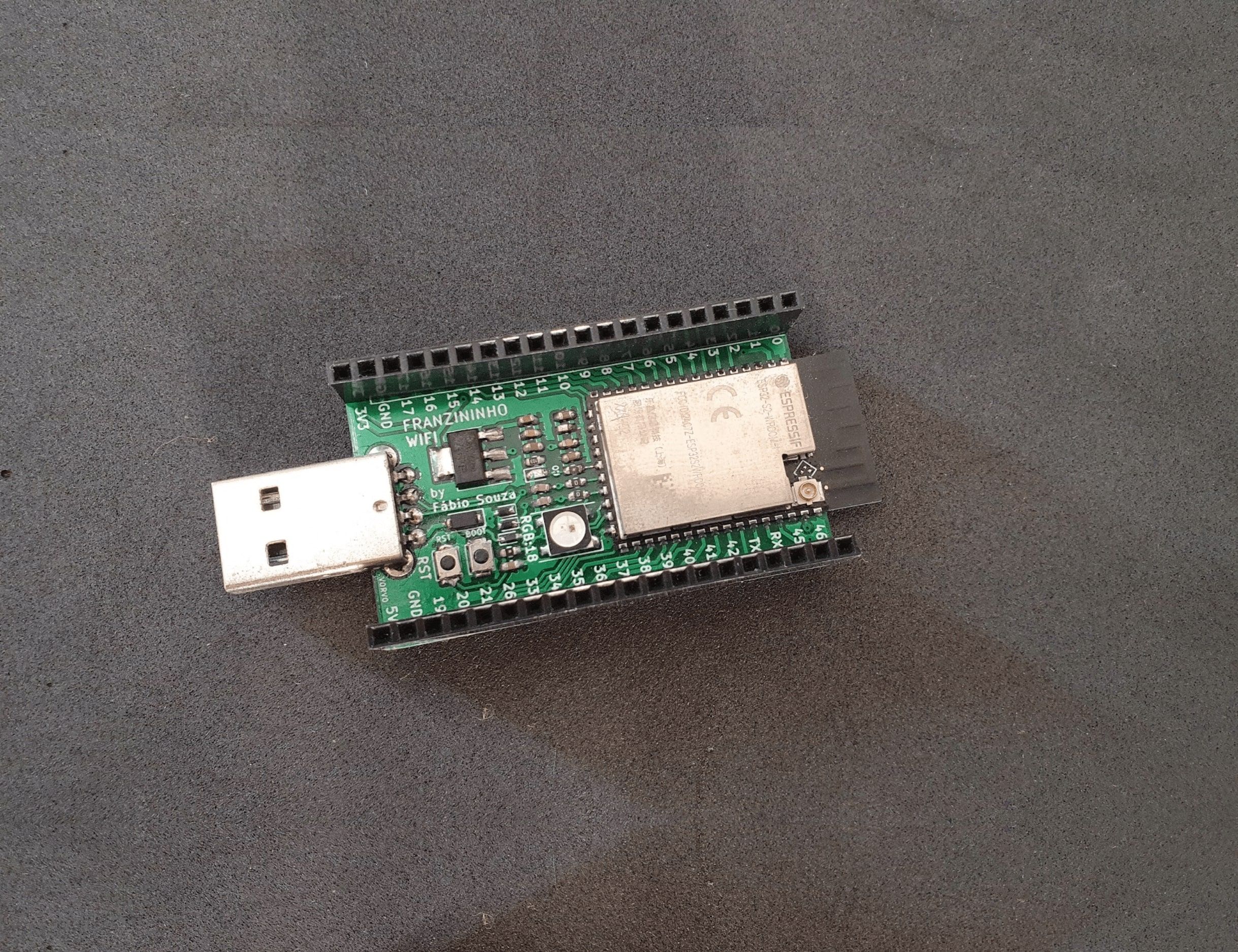
Franzininho WiFi Wroom by Franzininho
Franzininho WiFi Board is a development board to evaluate ESP32-S2 Modules (Wroom and Wrover) and develop the new generation of Franzininho Boards. The Franzininho project was created to develop skills in people in the areas of electronics and programming, through activities in the DIY format and in conjunction with maker culture in Brazil.
As there are not many boards on the Brazilian market with ESP32-S2, we developed Franzininho WiFi to serve as the ESP32-S2 development platform and help us evaluate and validate applications with this SoC.
This version comes with ESP32-S2 Wroom module.
Features:
- ESP32-S2 Wroom:
- Xtensa®single-core32-bit LX7 microprocessor, up to 240 MHz
- 128 KB ROM
- 320 KB SRAM
- 16 KB SRAM in RTC
- WiFi 802.11 b/g/n
- Interfaces: GPIO, SPI, LCD, UART, I2C, I2S, Camera interface, IR, pulse counter, LED PWM, TWAI(compatible with ISO 11898-1), USB 1.1OTG, ADC, DAC, touch sensor, temperature sensor.
- USB Type-A Male
- RGB LED (WS2812) (GPIO 18)
- 40 pin broken out to 2x20 2.54mm header pins(36 GPIO) - Breadboard Friendly
- Reset and DFU (BOOT0) buttons to get into the ROM bootloader (which is a USB serial port so you don’t need a separate cable!)
- Serial debug pins ( TX and RX, for checking the hardware serial debug console) JTAG pads for advanced debugging access.
- 3.3 V Power On LED
- 3.3 V Regulator
- Power:
- Micro USB port (default power supply)
- 5V and GND header pins
- 3V3 and GND header pins
- Dimensions: 72 mm x 30 mm
- Works with ESP-IDF or CircuitPython
Purchase
Add any links to purchase the board
Contribute
Have some info to add for this board? Edit the source for this page here.
CircuitPython 10.0.3
This is the latest stable release of CircuitPython that will work with the Franzininho WiFi Wroom. Use this release if you are new to CircuitPython.
Modules included in this download
_asyncio _eve _pixelmap adafruit_bus_device adafruit_pixelbuf aesio alarm analogbufio analogio array atexit audiobusio audiocore audioio audiomixer audiomp3 binascii bitbangio bitmapfilter bitmaptools board builtins builtins.pow3 busdisplay busio busio.SPI busio.UART canio codeop collections countio digitalio displayio epaperdisplay errno espidf espnow espulp fontio fourwire framebufferio frequencyio getpass gifio hashlib i2cdisplaybus io ipaddress jpegio json keypad keypad.KeyMatrix keypad.Keys keypad.ShiftRegisterKeys keypad_demux keypad_demux.DemuxKeyMatrix locale lvfontio math max3421e mdns memorymap microcontroller msgpack neopixel_write nvm onewireio os os.getenv paralleldisplaybus ps2io pulseio pwmio rainbowio random re rgbmatrix rotaryio rtc sdcardio select sharpdisplay socketpool socketpool.socketpool.AF_INET6 ssl storage struct supervisor synthio sys terminalio tilepalettemapper time touchio traceback ulab usb usb_cdc usb_hid usb_midi vectorio warnings watchdog wifi zlibFeatures: Wi-Fi
CircuitPython 10.1.0-rc.1
This is the latest development release of CircuitPython that will work with the Franzininho WiFi Wroom.
WARNING: On Espressif ESP32-S2 and ESP32-S3 boards with 4MB flash, CircuitPython 10.0.0-beta.0 and later require TinyUF2 bootloader version 0.33.0 or later. Older TinyUF2 bootloaders don't provide enough room for the firmware and cannot load it. See the Release Notes for more details, and see Update UF2 Bootloader below.
Alpha development releases are early releases. They are unfinished, are likely to have bugs, and the features they provide may change. Beta releases may have some bugs and unfinished features, but should be suitable for many uses. A Release Candidate (rc) release is considered done and will become the next stable release, assuming no further issues are found.
Please try alpha, beta, and rc releases if you are able. Your testing is invaluable: it helps us uncover and find issues quickly.
Modules included in this download
_asyncio _eve _pixelmap adafruit_bus_device adafruit_pixelbuf aesio alarm analogbufio analogio array atexit audiobusio audiocore audioio audiomixer audiomp3 binascii bitbangio bitmapfilter bitmaptools board builtins builtins.pow3 busdisplay busio busio.SPI busio.UART canio codeop collections countio digitalio displayio epaperdisplay errno espidf espnow espulp fontio fourwire framebufferio frequencyio getpass gifio hashlib i2cdisplaybus io ipaddress jpegio json keypad keypad.KeyMatrix keypad.Keys keypad.ShiftRegisterKeys keypad_demux keypad_demux.DemuxKeyMatrix locale lvfontio math max3421e mdns memorymap microcontroller msgpack neopixel_write nvm onewireio os os.getenv paralleldisplaybus ps2io pulseio pwmio rainbowio random re rgbmatrix rotaryio rtc sdcardio select sharpdisplay socketpool socketpool.socketpool.AF_INET6 ssl storage struct supervisor synthio sys terminalio tilepalettemapper time touchio traceback ulab usb usb_cdc usb_hid usb_midi vectorio warnings watchdog wifi zlibFeatures: Wi-Fi
Absolute Newest
Every time we commit new code to CircuitPython we automatically build binaries for each board and language. The binaries are stored on Amazon S3, organized by board, and then by language. These releases are even newer than the development release listed above. Try them if you want the absolute latest and are feeling daring or want to see if a problem has been fixed.
Previous Versions of CircuitPython
All previous releases of CircuitPython are available for download from Amazon S3 through the button below. For very old releases, look in the OLD/ folder for each board. Release notes for each release are available at GitHub button below.
Older releases are useful for testing if you something appears to be broken in a newer release but used to work, or if you have older code that depends on features only available in an older release. Otherwise we recommend using the latest stable release.
